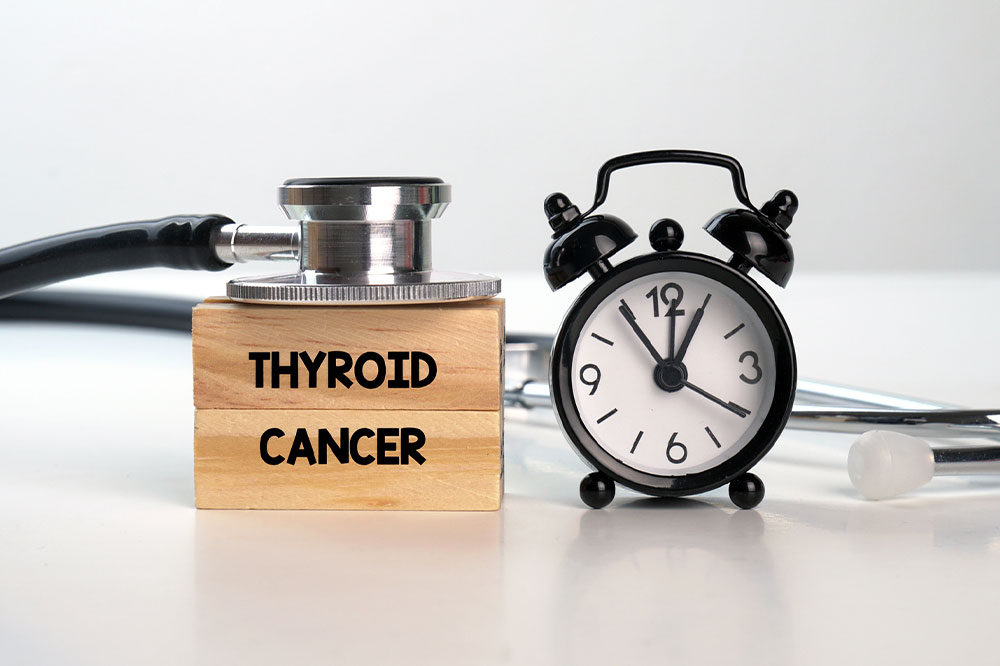Key Lifestyle Factors that Influence Thyroid Cancer

Thyroid cancer accounts for 4% of all newly diagnosed cancers across the country. This incidence has risen at a steady rate of 4.5 percent over the past 10 years. Symptoms that may indicate thyroid cancer include hoarseness, dysphagia or odynophagia, and adenopathy. However, adjusting lifestyle factors can significantly reduce the risk of thyroid cancer. Food and exercise are the essential pillars of preventing cancer and living a long, healthy life.
Factors that increase the risk of thyroid and other types of cancer in the body:
- Insulin resistance is associated with a high risk of thyroid cancer.
- Women are twice as likely to develop thyroid cancer than men.
- Storage of excess fat in the body.
- Head and neck radiation exposure, especially during childhood, significantly increases the risk for all thyroid cancers.
- Increased fat mass around the thyroid gland.
- Decreased muscle mass is associated with decreased recovery rates for many types of cancer.
- Relatives of thyroid patients are ten times more likely to develop the condition.
The thyroid gland’s primary function is the production of T3 and T4 hormones that manage the body’s metabolism. The World Cancer Research Fund and the American Institute for Cancer Research recommend the following general guidelines about food and fitness to minimize the risk of cancer:
- Eat plenty of vegetables daily
- Choose primarily whole grains
- Include dried beans or legumes for protein
- Limit processed meats and added sugars
- Be physically active
To diagnose cancer, doctors use ultrasound to confirm the presence of thyroid nodules and cystic lesions. Suspicious lesions are further investigated with fine-needle aspiration biopsy. The levels of thyroid-stimulating hormones are also checked, along with thyroid scintigraphy for those with elevated hormone levels.
Those with medullar or anaplastic thyroid cancer may be recommended radiation and chemotherapy at first. However, the primary therapy for most thyroid cancers is a thyroidectomy. This is often followed by postoperative radiation to deal with any residual tissue and prevent metastasis. Lifelong thyroid hormone replacement is necessary for all those who undergo surgery.
Making changes to food habits to manage thyroid cancer
While there are no detailed prescriptive guidelines for managing food to prevent thyroid cancer and promote recovery post-treatment, the European Prospective Investigation into Cancer and Nutrition (EPIC) Trial study recently answered this question. According to this research, a minimal impact of vegetable or fruit intake was noted on thyroid cancer. However, scientists did establish a link between cancer and the intake of juices.
Besides the EPIC trials, findings from the NIH-AARP suggest that eating vegetables regularly during adolescence can potentially increase protection against the development of thyroid cancer. This is due to the release of biologically active compounds like indoles and thiocyanates during food preparation and chewing. These food components promote better health by having antioxidant, anticancer, anti-inflammatory, antiviral, and antibacterial properties.
Reducing iodine intake
For those diagnosed with differentiated thyroid cancer (papillary, follicular, and poorly differentiated), lifestyle changes can improve the ability to get through treatment and recover. Experts popularly recommend reducing iodine intake temporarily. The goal is to make the thyroid glands “hungry” for iodine by temporarily eliminating as much of it as possible. The affected areas are then lit up during a scan and treated with radioactive iodine. Papillary thyroid cancer cells quickly absorb it, making way for more effective treatment.
A low-iodine plan requires the intake of 50 mg or less of iodine per day for about two weeks before a diagnostic procedure and up to 3 days after. One must avoid foods like fish, shellfish, seaweed, calcium supplements derived from oyster shells, iodized salt, egg yolks, dairy, blackstrap molasses, soy products, rhubarb, and bakery products made with iodized salt in the dough. Safe-to-eat foods include vegetables and fruits, nut butter, egg whites, fresh meats (less than 6 ounces per day), peeled sweet or regular potatoes, pasta, vegetable oils, whole grains, and salads with vinaigrette or other salt-free dressings.
Role of exercise in preventing thyroid cancer
While there isn’t any robust data that connects eating patterns with the development of thyroid cancer, the realm of exercise is more conclusive. According to experts at the American College of Sports Medicine, exercise reduces the risk of cancer by 10-20 percent and promises better survival rates for different types of cancer.
Experts also suggest that we might move towards a future where exercise can be specific and prescriptive in improving cancer incidence and outcomes. For example, aerobic activities such as interval training could prove to be most efficient, as it is excellent for managing insulin, controlling inflammation, and creating a metabolic profile less susceptible to cancer progression. It can also help decrease fat tissue, particularly the adipose tissue that collects around the thyroid gland and reduce cancerous conditions by regulating the production of hormones like estrogen and cortisol.
Adding resistance training to one’s workout regimen can also help increase muscle density and insulin sensitivity to improve the health and functionality of the cells in the body.
Identifying lifestyle patterns to reduce the risk of thyroid cancer
Since there was no reliable way of measuring evidence of lifestyle changes in thyroid cancer, the American College of Lifestyle Medicine and True Health Initiative worked collectively to develop a method to allow researchers to evaluate the effectiveness of lifestyle interventions. This method is known as Hierarchies in Evidence Applied to Lifestyle as Medicine (HEALM). Experts believe that with the right research applications and using techniques suggested by HEALM, it is possible to design lifestyle interventions that decrease the risk of thyroid cancer and increase recovery rates.
Conclusion
Until advancements are made in the field, it is important to adopt practices that reduce the risk of developing chronic ailments such as diabetes and heart disease. Generally, such plans may favor eating plant-rich foods, avoiding red meats and added sugars, and replacing processed foods with whole grains.






